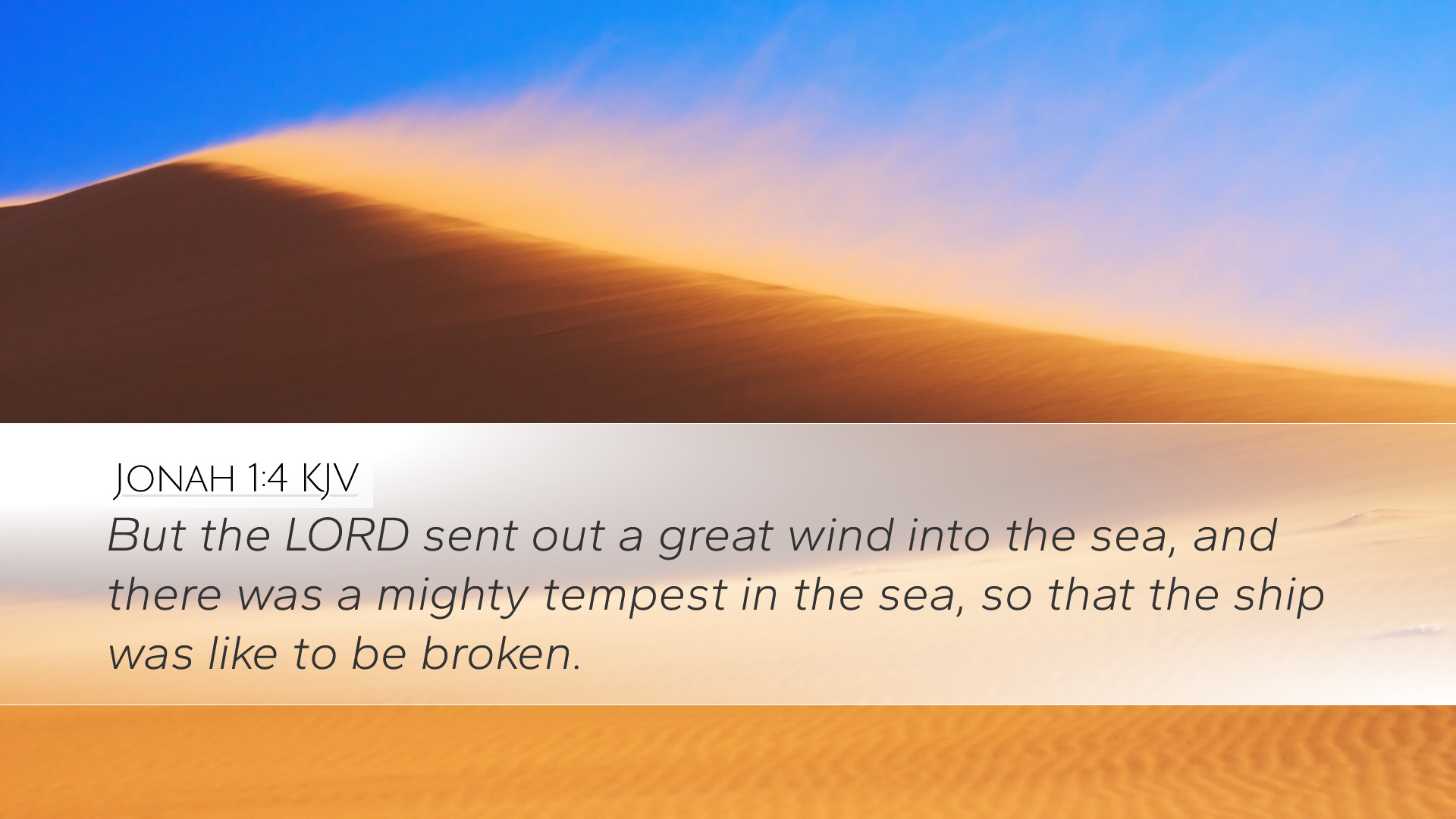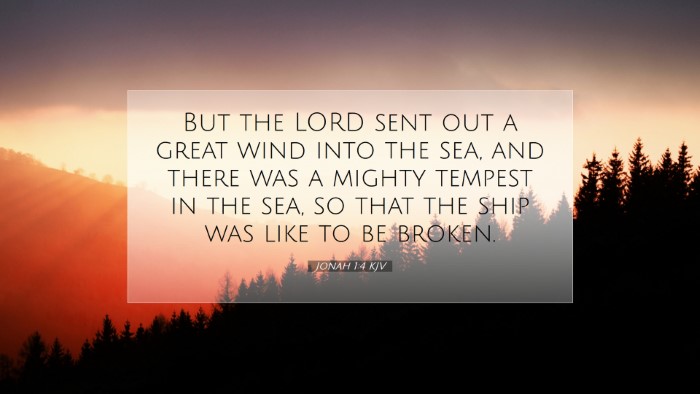Old Testament
Genesis Exodus Leviticus Numbers Deuteronomy Joshua Judges Ruth 1 Samuel 2 Samuel 1 Kings 2 Kings 1 Chronicles 2 Chronicles Ezra Nehemiah Esther Job Psalms Proverbs Ecclesiastes Song of Solomon Isaiah Jeremiah Lamentations Ezekiel Daniel Hosea Joel Amos Obadiah Jonah Micah Nahum Habakkuk Zephaniah Haggai Zechariah MalachiJonah 1:4
Jonah 1:4 KJV
But the LORD sent out a great wind into the sea, and there was a mighty tempest in the sea, so that the ship was like to be broken.
Jonah 1:4 Bible Commentary
Commentary on Jonah 1:4
The verse Jonah 1:4 states: "But the Lord sent out a great wind into the sea, and there was a mighty tempest in the sea, so that the ship was like to be broken." This passage serves as a pivotal moment in the narrative of Jonah, marking the beginning of the prophet's tumultuous journey. Below, we explore insights drawn from noteworthy public domain commentaries, intertwining their perspectives to illuminate the theological and practical implications of this verse.
Context and Overview
Jonah, a prophet called by God, is known for his reluctance to deliver God's message to the city of Nineveh. Instead, he attempts to flee from the divine mission, leading to a series of events that reveal God's sovereignty and mercy. This verse captures the tumultuous nature of Jonah's departure, showcasing both physical and spiritual dimensions of his disobedience.
The Divine Initiation of the Storm
The Lord's Intervention: Commentators emphasize that it is God who initiates the storm. Matthew Henry highlights that God, in His sovereignty, orchestrates events to redirect His wayward prophet. This is not merely a chance occurrence in nature but a deliberate act from the Almighty to challenge Jonah's flight from His calling.
Albert Barnes points out that the sending of the great wind serves to illustrate God’s control over creation. The tempest represents not only the physical storm but also the spiritual turmoil that arises from disobedience. The wind is described as “great” reflecting God's mighty power in contrast to Jonah's futile attempts to escape His will.
The Nature of the Tempest
Mighty Tempest: The tempest is characterized as “mighty” or “violent,” indicating the severity of the situation. Adam Clarke elaborates that the term used suggests a supernatural influence, hinting at the idea that this is no ordinary storm. It is a chaos unleashed by God himself, aimed at challenging not only Jonah but the entire ship's crew.
Furthermore, this tempest is symbolic of the chaos that arises from rebellion against God's directives. It serves as a reminder to both the original audience and modern-day readers that resistance to God’s will can lead to catastrophic consequences—not just on a personal level but also affecting those around us.
The Ship's Plight
Ship Like to Be Broken: The phrase “the ship was like to be broken” captures the dual crises at play: the physical danger the crew faces and a metaphorical representation of how disobedience disrupts the harmony of life. Henry notes that the ship symbolizes the world or the body of believers, suggesting that disobedience jeopardizes the collective and can lead to ruin.
Clarke adds depth to this imagery by suggesting that the ship, representing human endeavor, can be shattered by the tumult of divine disfavor. The ship’s potential destruction serves as a cautionary lesson about the dangers of straying from God’s path.
Theological Implications
God's Sovereignty: This verse emphatically portrays God's sovereignty over nature and human affairs. God is active and intervening in the course of history, demonstrating that no one can truly escape His will. This sovereignty is both a comfort and a warning to the faithful: God’s purposes will prevail regardless of human rebellion. Matthew Henry discusses this aspect, underscoring that even when one attempts to flee God’s presence, God can pursue and redirect effectively.
Human Responsibility: Jonah's choice to flee raises discussions on human responsibility and free will. Although God is sovereign, individuals still possess the agency to choose their paths, leading to consequences that impact themselves and others. Clarke emphasizes that Jonah's disobedience exemplifies how turning away from God can have perilous effects—not just for oneself but also for innocent bystanders.
Application for Today
This passage challenges modern believers to consider the implications of their actions and the importance of obedience to God's calling. Pastors and theologians may draw parallels between Jonah's flight and contemporary forms of avoidance in ministry and personal life.
- Awareness of Divine Pursuit: Just as God pursued Jonah through the storm, He actively seeks to redirect those who stray from His purpose.
- Impact of Disobedience: The storm that afflicted the ship draws attention to the broader implications of personal sin; it can affect communities and relationships.
- Invitation to Reflection: Believers are invited to reflect upon their call and the ways they might be resisting God's leading. This verse stands as a reminder that God equips and empowers those He calls, urging them to embrace their roles faithfully.
Conclusion
Jonah 1:4 serves as a profound reminder of the relationship between human obedience and divine sovereignty. The combined commentary from Matthew Henry, Albert Barnes, and Adam Clarke provides a rich tapestry of insights, prompting readers to explore their own lives concerning God's calling. As we reflect on this passage, may we be moved to recognize God's relentless pursuit of us, the gravity of our choices, and the importance of affirming our commitment to following His will.


